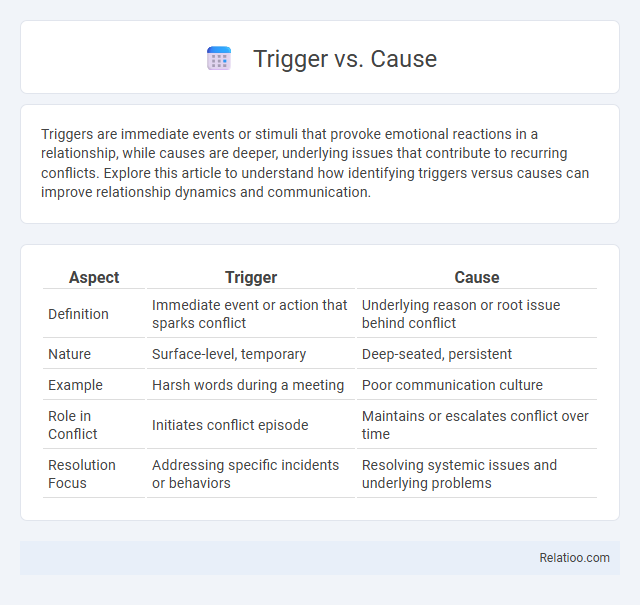Triggers are immediate events or stimuli that provoke emotional reactions in a relationship, while causes are deeper, underlying issues that contribute to recurring conflicts. Explore this article to understand how identifying triggers versus causes can improve relationship dynamics and communication.
Table of Comparison
| Aspect | Trigger | Cause |
|---|---|---|
| Definition | Immediate event or action that sparks conflict | Underlying reason or root issue behind conflict |
| Nature | Surface-level, temporary | Deep-seated, persistent |
| Example | Harsh words during a meeting | Poor communication culture |
| Role in Conflict | Initiates conflict episode | Maintains or escalates conflict over time |
| Resolution Focus | Addressing specific incidents or behaviors | Resolving systemic issues and underlying problems |
Understanding Triggers and Causes
Triggers are immediate stimuli or events that provoke a specific response, while causes refer to underlying factors or conditions that lead to an outcome. Understanding triggers involves identifying the precise moments or inputs that activate reactions, whereas causes explain the broader context and root reasons behind those triggers. Differentiating between triggers and causes is essential for effective problem-solving and behavioral analysis.
Defining ‘Trigger’ in Context
A trigger is an event or stimulus that initiates a specific reaction, often linked to emotional or physical responses, distinguishing it from a cause which broadly refers to any factor leading to an outcome. In psychological terms, a trigger activates memories or symptoms without necessarily being the underlying source. Understanding a trigger in context helps clarify its role as an immediate catalyst rather than the root cause of an issue.
What Constitutes a ‘Cause’?
A cause is an event or condition that directly brings about a specific outcome or effect, establishing a clear and necessary link between action and result. Unlike triggers, which are stimuli that can initiate a reaction without guaranteeing it, causes have a deterministic relationship with the effect they produce. Understanding what constitutes a cause helps you identify the fundamental factors responsible for changes or events in any given context.
Key Differences: Trigger vs Cause
The key difference between a trigger and a cause lies in their roles in an event's onset; a cause directly produces the event, while a trigger initiates or sparks the reaction without being the root reason. Causes represent underlying factors or conditions necessary for the event to occur, whereas triggers act as immediate stimuli that activate or provoke the caused effect. Understanding this distinction is essential in fields like medicine, psychology, and incident analysis, where pinpointing causes is crucial for prevention and triggers for timely management.
Examples of Triggers in Real Life
Triggers in real life can include loud noises causing a startle response, stressful work environments leading to anxiety, and certain foods sparking allergic reactions. Unlike causes, which are root origins of an issue, triggers activate an immediate reaction or symptom in Your body or mind. Recognizing these triggers helps in managing and preventing unwanted responses effectively.
Real-World Causes Behind Events
Triggers act as immediate stimuli that prompt a response or event, whereas causes represent the underlying factors or conditions leading to that event. Understanding the distinction helps you analyze real-world occurrences more accurately by identifying root causes rather than just surface triggers. This approach enables deeper insight into complex chains of events and informed decision-making.
When Do Triggers Become Causes?
Triggers are immediate events or stimuli that prompt a reaction, while causes refer to underlying factors that bring about an outcome. When triggers persist or escalate, they can evolve into causes by sustaining or worsening the condition. Understanding when your triggers shift into causes is crucial for effective intervention and management.
The Interplay Between Triggers and Causes
Triggers act as immediate stimuli that initiate a response, while causes represent deeper underlying factors that generate these triggers. The interplay between triggers and causes reveals a dynamic relationship where causes set the stage for triggers to emerge, influencing behavior or events. Understanding this interaction is essential for addressing root issues rather than just managing surface-level reactions.
Why Distinguishing Them Matters
Distinguishing between trigger and cause clarifies the root and immediate factors leading to an event, essential for accurate problem-solving and prevention strategies. Causes represent underlying conditions or long-term contributors, while triggers are specific incidents that provoke the event's occurrence. Understanding these differences enhances diagnostic accuracy in fields like medicine, psychology, and risk management.
Common Misconceptions About Triggers and Causes
Triggers and causes are often confused, but a cause directly leads to an event or condition, while a trigger acts as a catalyst that activates an existing condition or predisposition. Common misconceptions include treating triggers as root causes, overlooking that triggers merely provoke symptoms without being the initial source of a problem. Understanding this distinction is crucial for accurate diagnosis and effective intervention in fields like psychology, medicine, and risk management.

Infographic: Trigger vs Cause
 relatioo.com
relatioo.com